A coalition government is a form of government in which political parties cooperate to form a government. The usual reason for such an arrangement is that no single party has achieved an absolute majority after an election. A coalition government might also be created in a time of national difficulty or crisis to give a government the high degree of perceived political legitimacy or collective identity, it can also play a role in diminishing internal political strife. In such times, parties have formed all-party coalitions. If a coalition collapses, a confidence vote is held or a motion of no confidence is taken.

The United Kingdom is a unitary state with devolution that is governed within the framework of a parliamentary democracy under a constitutional monarchy in which the monarch, currently Queen Elizabeth II, is the head of state while the Prime Minister of the United Kingdom, currently Boris Johnson, is the head of government. Executive power is exercised by the British government, on behalf of and by the consent of the monarch, and the devolved governments of Scotland, Wales and Northern Ireland. Legislative power is vested in the two chambers of the Parliament of the United Kingdom, the House of Commons and the House of Lords, as well as in the Scottish and Welsh parliaments. The British political system is a two party system. Since the 1920s, the two dominant parties have been the Conservative Party and the Labour Party. Before the Labour Party rose in British politics, the Liberal Party was the other major political party, along with the Conservatives. While coalition and minority governments have been an occasional feature of parliamentary politics, the first-past-the-post electoral system used for general elections tends to maintain the dominance of these two parties, though each has in the past century relied upon a third party, such as the Liberal Democrats, to deliver a working majority in Parliament. A Conservative–Liberal Democrat coalition government held office from 2010 until 2015, the first coalition since 1945. The coalition ended following parliamentary elections on 7 May 2015, in which the Conservative Party won an outright majority of seats, 330 of the 650 seats in the House of Commons, while their coalition partners lost all but eight seats.
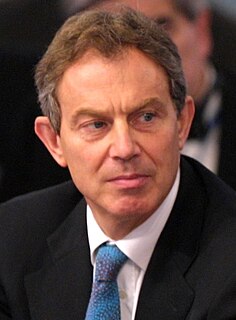
The 1997 United Kingdom general election was held on 1 May 1997. The governing Conservative Party led by Prime Minister John Major was defeated in a landslide by the Labour Party led by Tony Blair.
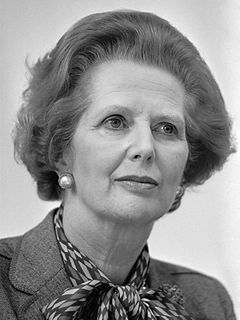
The 1983 United Kingdom general election was held on Thursday 9 June 1983. It gave the Conservative Party under the leadership of Margaret Thatcher the most decisive election victory since that of the Labour Party in 1945, with a landslide majority of 144 seats.
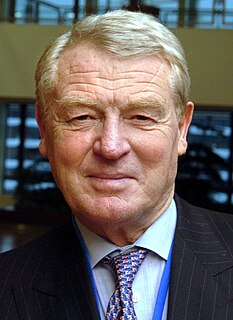
Jeremy John Durham Ashdown, Baron Ashdown of Norton-sub-Hamdon,, better known as Paddy Ashdown, was a British politician and diplomat who served as Leader of the Liberal Democrats from 1988 to 1999. Internationally, he is recognised for his role as High Representative for Bosnia and Herzegovina from 2002 to 2006, following his vigorous lobbying for military action against Yugoslavia in the 1990s.

Walter Menzies Campbell, Baron Campbell of Pittenweem,, often known as Ming Campbell, is a British Liberal Democrat politician, advocate and former athlete. He was the Member of Parliament (MP) for North East Fife from 1987 to 2015 and was the Leader of the Liberal Democrats from 2 March 2006 until 15 October 2007.
In British politics, a Lib–Lab pact is a working arrangement between the Liberal Democrats and the Labour Party.
A hung parliament is a term used in legislatures under the Westminster system to describe a situation in which no particular political party or pre-existing coalition has an absolute majority of legislators in a parliament or other legislature. This situation is also known, albeit less commonly, as a balanced parliament, or as a legislature under no overall control, and can result in a minority government. The term is not relevant in multi-party systems where it is rare for a single party to hold a majority.
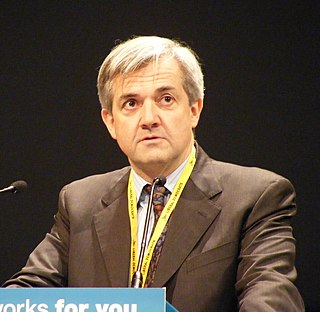
Christopher Murray Paul-Huhne is a British energy and climate change consultant and former journalist and politician who was the Liberal Democrat Member of Parliament for Eastleigh from 2005 to 2013 and the Secretary of State for Energy and Climate Change from 2010 to 2012. From September 2013 to August 2014 he wrote a weekly column for The Guardian.

The 2005 United Kingdom general election was held on Thursday 5 May 2005, to elect 646 members to the House of Commons. The Labour Party, led by Tony Blair, won its third consecutive victory, with Blair becoming the only Labour leader besides Harold Wilson to form three majority governments. However, its majority fell to 66 seats compared to the 167-seat majority it had won four years before. This was the first time the Labour Party had won a third consecutive election, and remains the party's most recent general election victory.

Michael James Meadowcroft is a British author, politician and political affairs consultant. He served as the Member of Parliament (MP) for Leeds West from 1983 to 1987.
This timeline of events in the Liberal Democrats leadership election, 2006 lists the events covering the period from Charles Kennedy's initial call for a leadership election with the Liberal Democrats to the conclusion of the 2006 Liberal Democrats leadership election.
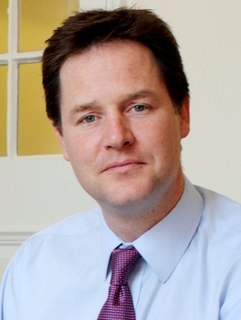
The 2007 Liberal Democrats leadership election was held following the resignation of Sir Menzies Campbell as leader on 15 October 2007, after 19 months as leader of the Liberal Democrats, the third-largest political party in the United Kingdom. Vincent Cable, the deputy leader of the parliamentary party, was acting leader until the conclusion of the leadership election. The result was announced on 18 December 2007 with Nick Clegg winning by a narrow margin of 1.2%.
In parliamentary politics, balance of power is a situation in which one or more members of a parliamentary or similar chamber can by their uncommitted vote enable a party to attain and remain in minority government. The term may also be applied to the members who hold that position. The members holding the balance of power may guarantee their support for a government by either joining it in a coalition government or by an assurance that they will vote against any motion of no confidence in the government or will abstain in such a vote. In return for such a commitment, such members may demand legislative or policy commitments from the party they are to support. A person or party may also hold a balance of power in a chamber without any commitment to government, in which case both the government and opposition groupings may on occasion need to negotiate for that person's or party's support.

The Liberal Democrats are a liberal political party in the United Kingdom. The party has 12 Members of Parliament in the House of Commons, 89 members of the House of Lords, four Members of the Scottish Parliament, one member in the Welsh Senedd and two members in the London Assembly. The party served as the junior party in a coalition government with the Conservative Party between 2010–2015, with Scottish Labour in the Scottish Executive from 1999 to 2007, and with Welsh Labour in the Welsh Government from 2016 to 2021.

The United Kingdom Alternative Vote referendum, also known as the UK-wide referendum on the Parliamentary voting system was held on Thursday 5 May 2011 in the United Kingdom (UK) to choose the method of electing MPs at subsequent general elections. It occurred as a provision of the Conservative–Liberal Democrat coalition agreement drawn up in 2010 and also indirectly in the aftermath of the 2009 expenses scandal. It operated under the provisions of the Parliamentary Voting System and Constituencies Act 2011 and was the first national referendum to be held under provisions laid out in the Political Parties, Elections and Referendums Act 2000.
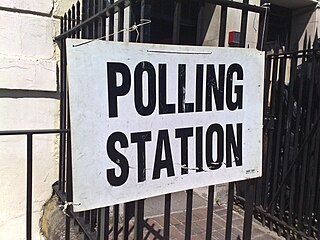
The events surrounding the formation of the United Kingdom's government in 2010 took place between 7 May and 12 May 2010, following the 2010 general election, which failed to produce an overall majority for any of the country's two main political parties. The election, held on 6 May, resulted in the first hung parliament in the UK in 36 years, sparking a series of negotiations which would form the second coalition government since the Second World War.
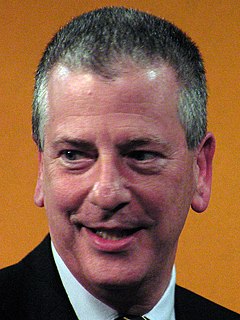
The Eastleigh by-election, 2013 was a parliamentary by-election held on 28 February 2013 for the United Kingdom House of Commons constituency of Eastleigh in Hampshire.
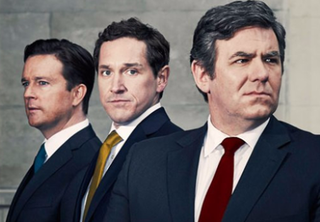
Coalition is a 2015 British television film about the formation of a coalition government following the 2010 United Kingdom general election. It was broadcast on Channel 4 on 28 March 2015, shortly before that year's general election. The film was written by James Graham and starred Bertie Carvel as Nick Clegg, Ian Grieve as Gordon Brown, and Mark Dexter as David Cameron. Graham wrote the film in the aim of giving humanity and enabling empathy to all of the figures portrayed within it, which earned it positive reviews from critics.













